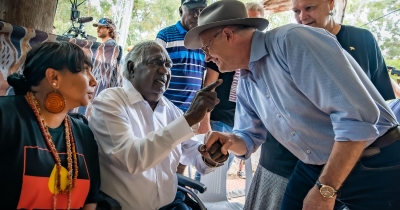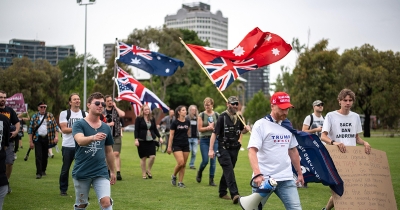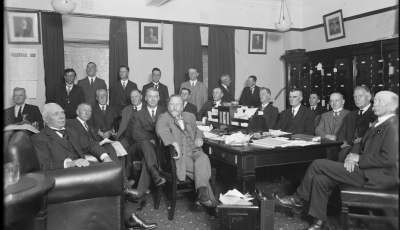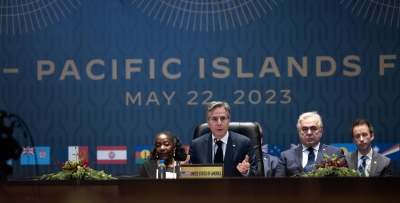Commentary
On many occasions throughout our nation’s history, change seemed imminent, perhaps even just on the horizon, but it has always receded into the distance. The instigation and then closure of successive important representative organisations such as the National Aboriginal Consultative Committee, the National Aboriginal Conference, the Aboriginal and Torres Strait Islander Commission, and the National Congress of Australia’s First Peoples illustrate the impacts of electoral politics and the vagaries of political ideologies. Each decade seems to have brought a different structure, some more and some less representative than others. But there has been little continuity or coherence, in either the national or state administrative and political arrangements, in addressing the specific concerns of Indigenous people.
... (read more)There are many impressive things about the first edition of The Oxford English Dictionary (OED), but one in particular has long puzzled me. As an Australian, I have always been struck by its excellent coverage of Australian words. I am not talking about the inclusion of obvious words such as kookaburra, woomera, and fossick, but rather the hundreds of lesser-known words such as wonga-wonga (pigeon), wurley (hut), and yarran (species of acacia), and even more obscure ones such as brickfielder, defined as a ‘local name in Sydney, New South Wales, for a thick cloud of dust brought over the city by a south wind from neighbouring sandhills (called the ‘Brickfields’)’.
... (read more)From the age of fifteen until his recent death at the age of seventy-four, the great Yolngu leader Yunupingu (1948–2023) was at the forefront of the struggle to change the Australian legal system in unprecedented ways. In 1963, with his father, Mungurrawuy, he drafted the Yirrkala Bark Petition, which presented to Parliament an eloquent claim for the rights of the Indigenous peoples of Arnhem Land before their country was, without their consent, turned into a bauxite mine. The Bark Petition was no ordinary document. On the one hand, it uses the antiquated language of a traditional ‘humble petition’ to Parliament, concluding in forms of speech that have hardly changed since the seventeenth century: ‘And your petitioners as in duty bound will ever pray.’
... (read more)Clare Wright’s letter in response to Bain Attwood (ABR, August 2023) should profoundly disturb and unsettle anyone in this country concerned about the survival of active, rigorous, and engaged historical scholarship.
... (read more)The stumping of Jonny Bairstow reminded me of reaction chains. Bairstow, in case you didn’t waste winter nights watching the Ashes, was the English batsman controversially stumped by Australian wicketkeeper Alex Carey during the second Test at Lord’s. Pandemonium ensued, with the poohbahs of the Marylebone Cricket Club berating the Australian team during the lunch break as they filed through the holiest of holies, the Long Room. The brouhaha led news bulletins around the cricketing world; even the prime ministers of Australia and the Old Enemy weighed in.
... (read more)‘Why should I be expected to rise above my times? Is it my doing that my times have been so shameful? Why should it be left to me, old and sick and full of pain, to lift myself out of this pit of disgrace?
... (read more)Pressure is mounting on the Albanese government to recognise Palestine as a state. Following a resolution moved by Penny Wong, this became ALP party policy in 2021, and it will almost certainly be reaffirmed at this year’s party conference in August. Former Foreign Minister Gareth Evans has written a powerful defence of the policy, which has been assailed, predictably, by the Israel lobby.
... (read more)On election day in 2022, thousands of Australian voters – perhaps already in line at their local primary school, democracy sausage in hand – received this text message. Refugees had not been a hot-button issue in this election, and the messages were generally seen as an unsuccessful last-ditch effort by a Coalition government already on the ropes. But the new Albanese Labor government was quick to confirm, just a day after being sworn in, that it had turned the boat back without hesitation. A public warning was issued to people smugglers that Australia’s border policy remained iron-clad and inflexible. Such statements are usually for the benefit of the Australian public, rather than an imagined audience of people smugglers.
... (read more)In 22 May 2023, US Secretary of State Antony Blinken and Papua New Guinea (PNG) Defence Minister Win Bakri Daki signed a defence and maritime cooperation agreement in Port Moresby. Blinken stepped in after US President Joe Biden’s last-minute cancellation. Had he attended, it would reportedly have been the first time a US president had visited a Pacific Island country other than US territories such as Hawaii and Guam. This is on the back of having pledged an additional US$800 million at a US-Pacific Summit in late 2022 to help tackle climate change, overfishing, and maritime security.
... (read more)Justice Anthony Besanko’s dismissal of Ben Roberts-Smith’s defamation proceedings against a trio of mastheads – The Age, The Canberra Times, and The Sydney Morning Herald, at the time all owned by Fairfax – was a comprehensive victory for those newspapers. It was a vindication of their serious investigative journalism on matters of high public interest. And it was a devastating blow to the reputation of Roberts-Smith.
... (read more)









